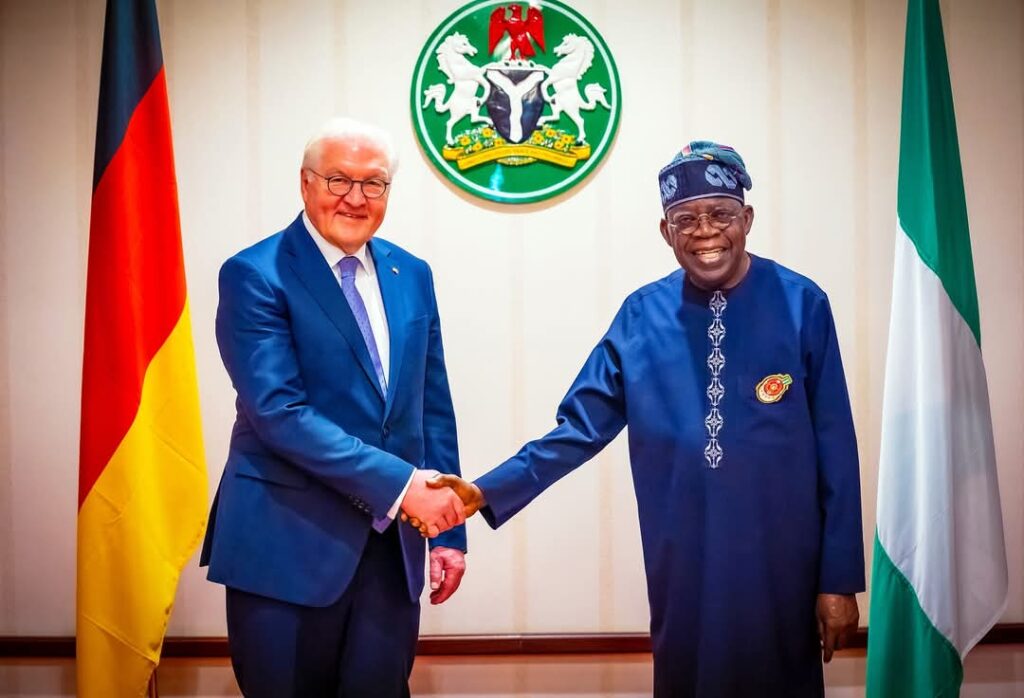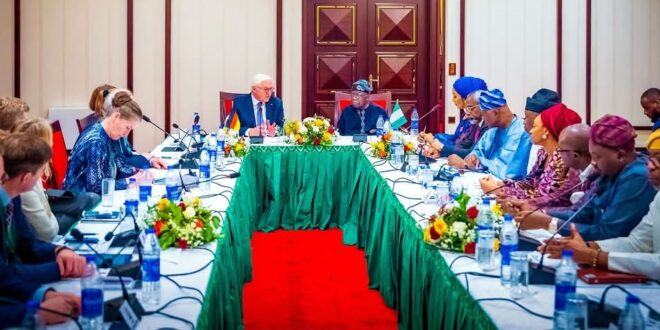German President Frank-Walter Steinmeier undertook a four-day visit to Africa from 10 to 14 December, focusing on strengthening Germany’s ties with Nigeria, South Africa and Lesotho. His trip underscored Germany’s commitment to enhancing economic cooperation, supporting political reforms and promoting sustainable development across the continent, the German presidency said.
Nigeria: Energy and Economic Cooperation
Steinmeier began his tour in Nigeria, where he was welcomed with military honours by President Bola Ahmed Tinubu in Abuja. The two leaders focused on expanding their countries’ longstanding partnership, especially in the energy sector. Steinmeier highlighted Germany’s move towards renewable energy and the growing emphasis on green hydrogen production, while Tinubu reaffirmed Nigeria’s commitment to creating a business-friendly environment. Nigeria is Germany’s second-largest trading partner in sub-Saharan Africa.
“Our countries have a solid foundation based on a rich history of collaboration in important sectors such as energy, agriculture, education, development, technology, and renewables,” the Nigerian leader said. “The bilateral discussions and the business forum that took place during this visit offered a valuable opportunity to further strengthen and expand this critical partnership between Nigeria and Germany as we look towards the future.”

The discussions also covered Nigeria’s political and economic reforms, which have improved its investment climate. German companies have responded positively, with some committing to renewable energy projects and natural gas exports to Germany, the German leader said.
Steinmeier, who was accompanied by a delegation of prominent German business leaders, praised young Nigerians studying in Germany as “wonderful bridge builders,” fostering stronger ties between the nations. “They help to deepen the links between our countries even further. At the same time, they are contacts for German companies,” he said.
In Lagos, he explored the city’s thriving tech sector, known as “Silicon Lagoon,” and visited the Nike Art Gallery. He also engaged with Nobel laureate Wole Soyinka, reinforcing Germany’s cultural ties with Nigeria.
South Africa: Economic Investment and Historical Reflection
In South Africa, Steinmeier met with President Cyril Ramaphosa, emphasizing the vital economic relationship between the two countries. Over 600 German companies operate in South Africa, employing more than 100,000 people and contributing to technical skills capacity building, especially through vocational training initiatives. Steinmeier commended these companies for their role in fostering sustainable development.
The visit also included a somber moment of reflection at Freedom Park in Pretoria, where Steinmeier laid a wreath at the Flame of Freedom, commemorating victims of apartheid and war. He later held discussions with South African leaders
Steinmeier honoured Sabine Dall’Omo, President of the Afrika-Verein or Africa Association of German Business, with the Federal Cross of Merit First Class for her contributions to German-African relations.. In his laudatory speech, the German president particularly emphasised Dall’Omo’s social commitment, such as the initiation of educational programmes for South African girls or her commitment to the construction of a hospital in South Africa during the COVID pandemic. Afrika-Verein represents German companies with business interests on the African continent.
Lesotho: A First for Germany’s Head of State
Steinmeier concluded his trip with a historic visit to Lesotho, becoming the first German head of state to tour the mountainous nation. King Letsie III hosted him in Maseru, where Steinmeier praised Lesotho’s commitment to democracy and multilateralism.
The President visited the EU and German-funded ReNOKA water management project, which underscores Lesotho’s crucial role as a water supplier to South Africa’s industrial regions, including Johannesburg. He lauded the collaborative efforts between Lesotho, Germany and the EU in developing advanced water management technologies, emphasizing their importance for regional sustainability.
Strengthening Partnerships for the Future
Steinmeier’s visit highlighted Germany’s multifaceted engagement with Africa, spanning energy, technology, education and sustainable development. By fostering dialogue and exploring opportunities for deeper collaboration, the trip reaffirmed Germany’s dedication to supporting Africa’s growth while addressing shared global challenges.
The outcomes of Steinmeier’s trip are expected to pave the way for stronger bilateral and regional partnerships, reflecting Germany’s evolving role as a committed partner to African nations.
Sola Jolaoso
 THE AFRICAN COURIER. Reporting Africa and its Diaspora! The African Courier is an international magazine published in Germany to report on Africa and the Diaspora African experience. The first issue of the bimonthly magazine appeared on the newsstands on 15 February 1998. The African Courier is a communication forum for European-African political, economic and cultural exchanges, and a voice for Africa in Europe.
THE AFRICAN COURIER. Reporting Africa and its Diaspora! The African Courier is an international magazine published in Germany to report on Africa and the Diaspora African experience. The first issue of the bimonthly magazine appeared on the newsstands on 15 February 1998. The African Courier is a communication forum for European-African political, economic and cultural exchanges, and a voice for Africa in Europe.




























